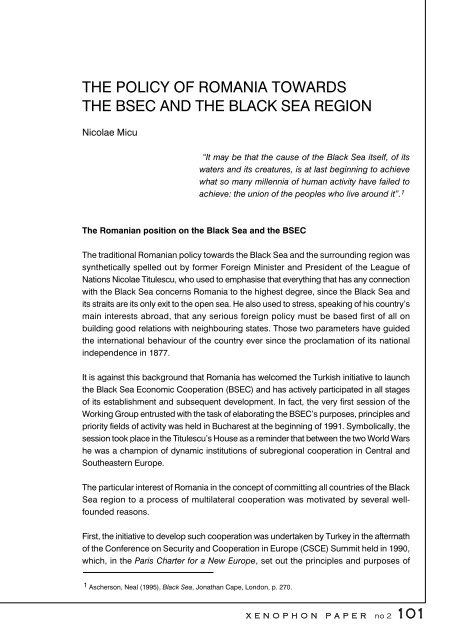Xenophon Paper 2 pdf - ICBSS
Xenophon Paper 2 pdf - ICBSS
Xenophon Paper 2 pdf - ICBSS
Create successful ePaper yourself
Turn your PDF publications into a flip-book with our unique Google optimized e-Paper software.
THE POLICY OF ROMANIA TOWARDS<br />
THE BSEC AND THE BLACK SEA REGION<br />
Nicolae Micu<br />
“It may be that the cause of the Black Sea itself, of its<br />
waters and its creatures, is at last beginning to achieve<br />
what so many millennia of human activity have failed to<br />
achieve: the union of the peoples who live around it”. 1<br />
The Romanian position on the Black Sea and the BSEC<br />
The traditional Romanian policy towards the Black Sea and the surrounding region was<br />
synthetically spelled out by former Foreign Minister and President of the League of<br />
Nations Nicolae Titulescu, who used to emphasise that everything that has any connection<br />
with the Black Sea concerns Romania to the highest degree, since the Black Sea and<br />
its straits are its only exit to the open sea. He also used to stress, speaking of his country’s<br />
main interests abroad, that any serious foreign policy must be based first of all on<br />
building good relations with neighbouring states. Those two parameters have guided<br />
the international behaviour of the country ever since the proclamation of its national<br />
independence in 1877.<br />
It is against this background that Romania has welcomed the Turkish initiative to launch<br />
the Black Sea Economic Cooperation (BSEC) and has actively participated in all stages<br />
of its establishment and subsequent development. In fact, the very first session of the<br />
Working Group entrusted with the task of elaborating the BSEC’s purposes, principles and<br />
priority fields of activity was held in Bucharest at the beginning of 1991. Symbolically, the<br />
session took place in the Titulescu’s House as a reminder that between the two World Wars<br />
he was a champion of dynamic institutions of subregional cooperation in Central and<br />
Southeastern Europe.<br />
The particular interest of Romania in the concept of committing all countries of the Black<br />
Sea region to a process of multilateral cooperation was motivated by several wellfounded<br />
reasons.<br />
First, the initiative to develop such cooperation was undertaken by Turkey in the aftermath<br />
of the Conference on Security and Cooperation in Europe (CSCE) Summit held in 1990,<br />
which, in the Paris Charter for a New Europe, set out the principles and purposes of<br />
1 Ascherson, Neal (1995), Black Sea, Jonathan Cape, London, p. 270.<br />
X E N O P H O N P A P E R no 2 101









